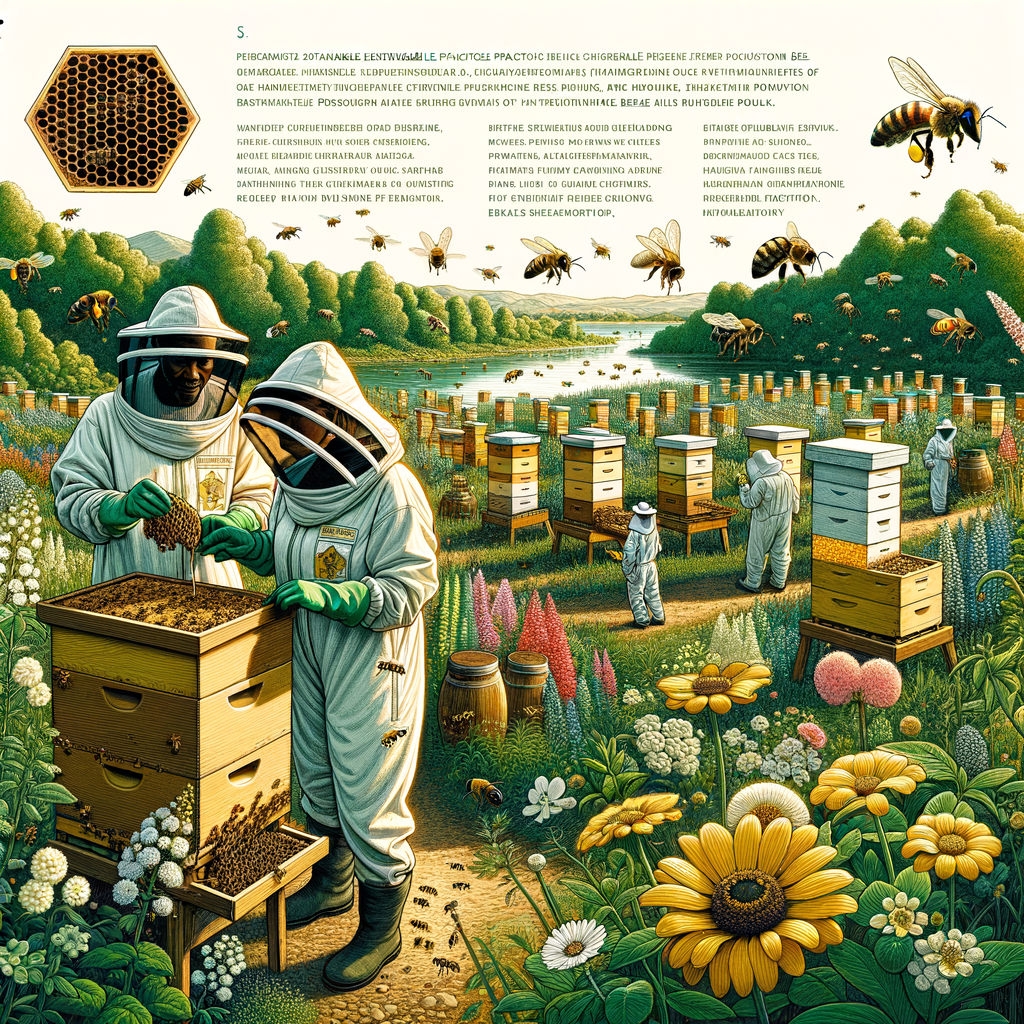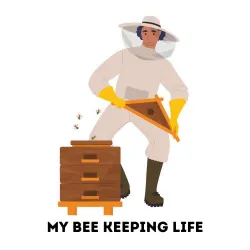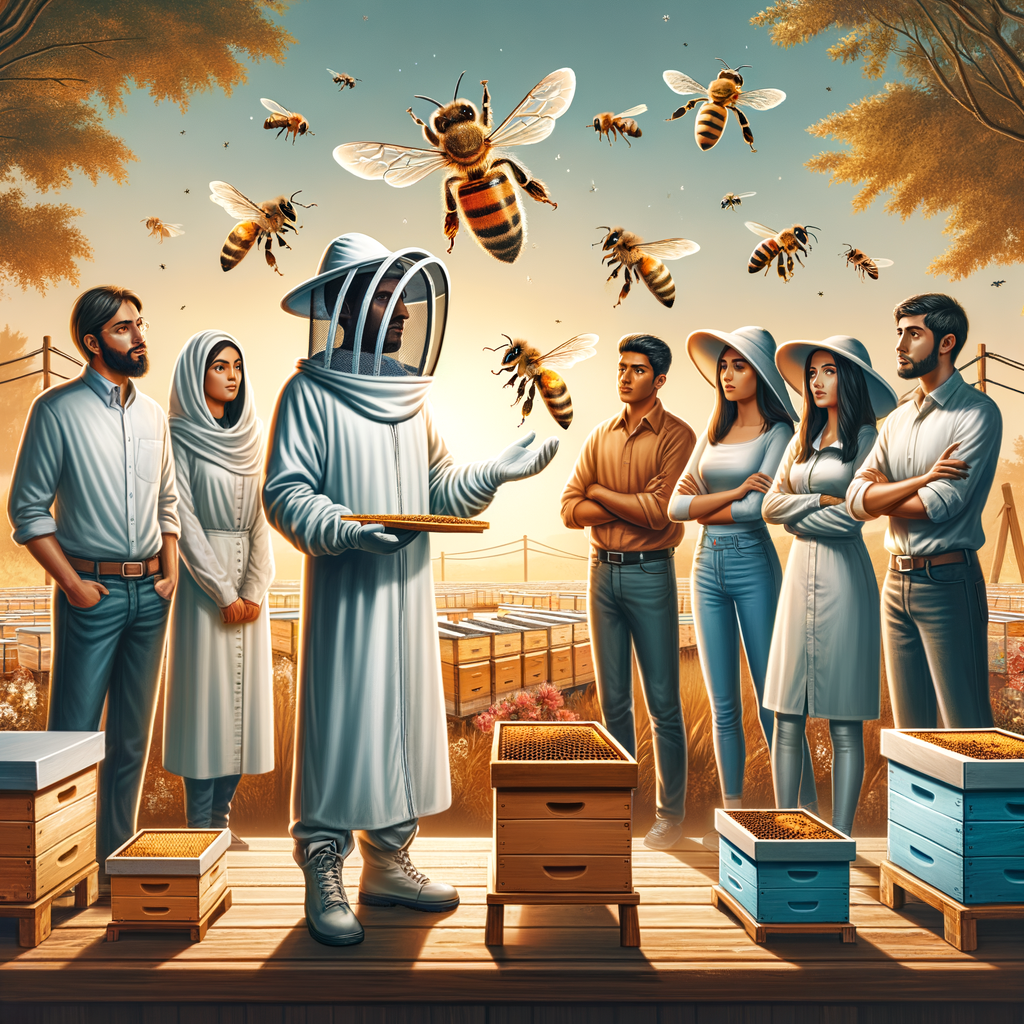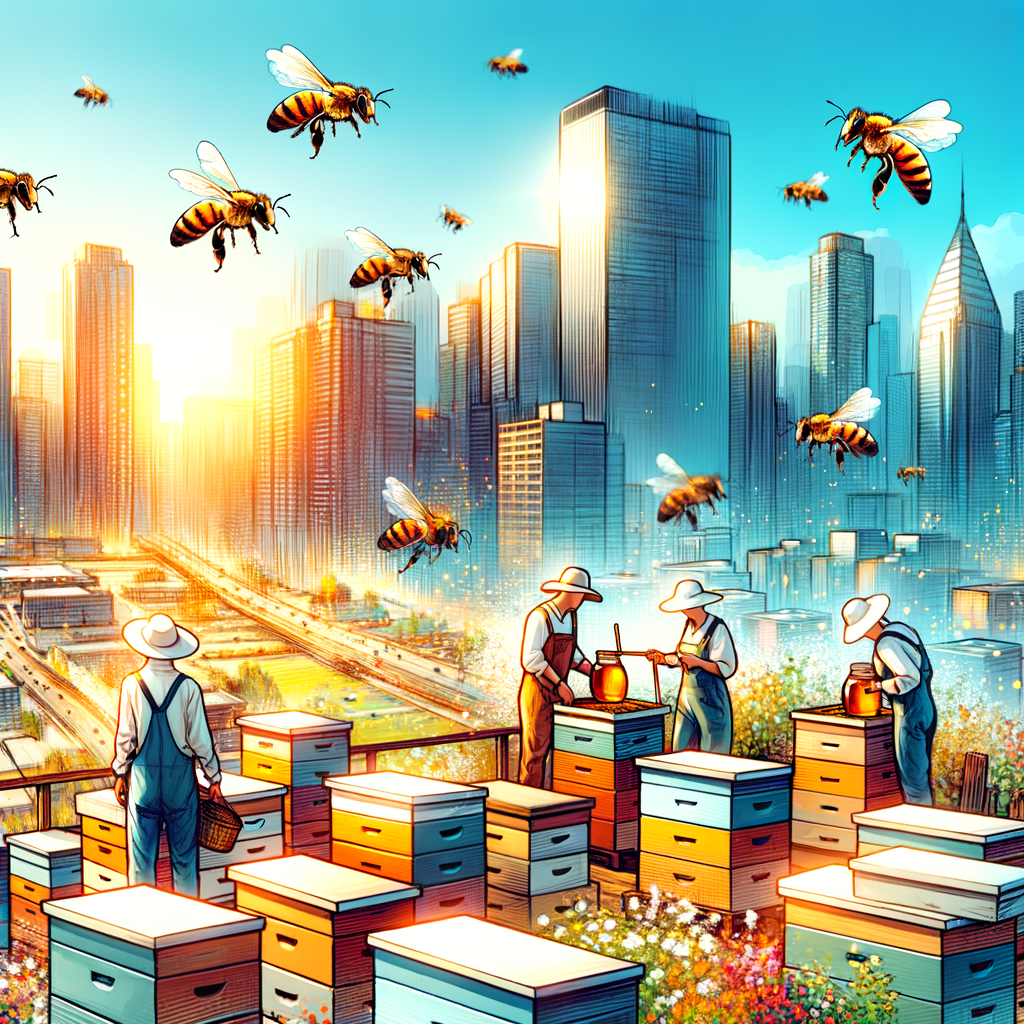
Introduction to Beekeeping
Have you ever wondered how honey is made? Or perhaps you’re curious about the buzzing creatures that make it? Welcome to the fascinating world of beekeeping! In this article, we’ll explore the basics of beekeeping and its significant role in agriculture. Let’s dive in!
- Understanding the basics of beekeeping
- The role of beekeeping in agriculture
Beekeeping, also known as apiculture, is the practice of maintaining bee colonies, usually in hives. It’s an ancient tradition that dates back to the earliest civilizations. Beekeepers, also known as apiarists, manage the bees to collect their honey and other products like beeswax, pollen, and royal jelly. They also provide pollination services to fruit and vegetable crops.
There’s a lot to learn when it comes to beekeeping. It’s not just about putting bees in a box and collecting honey. You need to understand the life cycle of bees, their behavior, and how to manage their health. It’s a rewarding hobby that requires patience, knowledge, and a love for nature.
Beekeeping plays a crucial role in agriculture. Bees are nature’s most efficient pollinators. They help fertilize flowers by transferring pollen from the male parts of a flower to the female parts. This process leads to the growth of fruits and seeds.
Without bees, our food system would look very different. According to the United States Department of Agriculture, bees help pollinate approximately 75% of the fruits, nuts, and vegetables grown in the United States. This shows how vital bees and beekeeping are to our food supply.
In the following sections, we’ll delve deeper into the benefits of beekeeping, its impact on bee populations and biodiversity, sustainable practices, and the effects of beekeeping on bees. Stay tuned to learn more about this exciting and important field!
Benefits of Beekeeping
There are many wonderful benefits to beekeeping that can positively impact our environment, economy, and society. Let’s take a closer look at each of these benefits.
- Environmental Benefits
Beekeeping plays a crucial role in supporting our environment. Bees are known as nature’s best pollinators. They help flowers, plants, and crops to grow. Without bees, many of the foods we love, like apples, almonds, and blueberries, would become much harder to grow. According to a study, bees help to pollinate about one-third of the food we eat. That’s a big job!
Bees also help to create habitats for other wildlife. They pollinate plants that provide food and shelter for insects, birds, and small mammals. So, by keeping bees, we are helping to support a wide range of wildlife.
- Economic Benefits
Beekeeping can also have economic benefits. For starters, honey, a natural sweetener produced by bees, can be sold for profit. In the United States alone, honey is a multi-million dollar industry. Beekeepers can also sell other bee products like beeswax, which is used in candles, cosmetics, and food.
Furthermore, bees play a vital role in agriculture. They help to pollinate crops, which increases yield and quality. This is incredibly important for farmers and the economy as a whole.
- Social Benefits
Finally, beekeeping has social benefits. It can bring communities together, teaching people about nature and the importance of bees. It can also be a relaxing and rewarding hobby. Some people even find that spending time with bees helps to reduce stress and improve mental health.
Beekeeping can also provide educational opportunities. Schools and community groups often set up bee hives to teach children and adults about the environment and the role of bees in our ecosystem.
In conclusion, beekeeping has many benefits. It helps our environment, supports our economy, and brings people together. So, why not consider becoming a beekeeper yourself? You’ll be helping the bees, and they’ll be helping you too!
Impact of Beekeeping on Bee Populations
One of the most significant impacts of beekeeping is its effect on bee populations. Let’s delve into how beekeeping can help increase these populations and explore a case study that highlights this impact.
Bee Population Increase
Understanding the role of beekeeping in increasing bee populations is crucial. There are two main ways in which this happens:
- How beekeeping helps increase bee populations
- Case study: Bee population growth in urban areas
Beekeeping, when done responsibly, can significantly boost bee populations. This is because beekeepers provide a safe and nurturing environment for bees to thrive. They ensure that the bees have enough food and water, and they protect the bees from predators and diseases. Moreover, beekeepers often introduce new bees to their hives, which helps to increase the overall bee population.
Urban beekeeping has been on the rise in recent years, and it’s having a positive impact on bee populations. For instance, in New York City, the number of registered beekeepers has increased by over 300% in the last decade. This has led to a significant increase in the city’s bee population. The bees, in turn, have helped to pollinate the city’s green spaces, leading to more vibrant and diverse plant life.
In conclusion, beekeeping plays a vital role in increasing bee populations. By providing a safe environment for bees and introducing new bees to their hives, beekeepers can help to ensure the survival and growth of these essential creatures.
Role of Beekeeping in Bee Conservation
Beekeeping, also known as apiculture, plays a significant role in conserving bees. Let’s explore how this practice contributes to bee conservation and look at some successful projects that have made a difference.
- How Beekeeping Contributes to Bee Conservation
- Case Study: Successful Bee Conservation Projects
Beekeeping is more than just a hobby or a means of producing honey. It’s a crucial part of bee conservation efforts. Bees are vital for pollination, which is essential for our food supply. However, bees are facing numerous threats, including habitat loss, pesticides, and climate change. Beekeepers help combat these threats in several ways.
Firstly, beekeepers provide bees with a safe and stable environment. They ensure that the bees have enough food and water, and they protect the bees from predators and diseases. Secondly, beekeepers help to increase bee populations. By managing hives, they can encourage the growth of bee colonies. Lastly, beekeepers play a role in educating the public about the importance of bees and the threats they face.
There are many successful bee conservation projects around the world that involve beekeeping. Let’s look at two examples.
| Project | Location | Impact |
|---|---|---|
| The Honeybee Conservancy | United States | This organization not only promotes beekeeping but also provides resources and education to the public. They have installed over 300 bee hives in community gardens, schools, and other locations, helping to increase bee populations. |
| Bee Life European Beekeeping Coordination | Europe | This group works to protect bees and other pollinators in Europe. They advocate for sustainable beekeeping practices and policies that protect bees. Their efforts have contributed to the growth of bee populations in several European countries. |
These projects show how beekeeping can make a real difference in bee conservation. By supporting beekeepers and promoting sustainable practices, we can help ensure the survival of these vital creatures.
Beekeeping and Biodiversity
When we think about beekeeping, we often focus on the honey production. However, beekeeping plays a significant role in promoting biodiversity and maintaining the health of local ecosystems. Let’s delve into these aspects.
- How beekeeping promotes biodiversity
- Effects of beekeeping on local ecosystems
Beekeeping is a crucial factor in promoting biodiversity. Bees are known as pollinators. They help plants reproduce by transferring pollen from the male parts of a flower to the female parts. This process is vital for the growth of fruits, vegetables, and nuts that we eat daily.
Without bees, many of these plants would struggle to reproduce, leading to a decrease in plant diversity. By keeping bees, we ensure that these essential pollinators can continue their work, promoting a diverse and healthy ecosystem.
Beekeeping also has a profound impact on local ecosystems. Bees play a vital role in the food chain. They provide food for a variety of creatures, including birds and small mammals. By keeping bees, we help to support these animals and maintain a balanced ecosystem.
Moreover, bees help to improve the quality of our landscapes. They pollinate plants that provide habitats for other creatures. Without bees, these habitats would be at risk. Thus, beekeeping contributes to the preservation and enhancement of local ecosystems.
In conclusion, beekeeping is not just about honey production. It’s about supporting biodiversity and maintaining the health of our ecosystems. By understanding this, we can appreciate the true value of beekeeping and work towards more sustainable practices.
Sustainable Beekeeping Practices
As we delve into the world of beekeeping, it’s important to understand the best practices that promote sustainability. Sustainable beekeeping is not only beneficial to the beekeepers but also to the honeybee population and the environment at large.
- Best practices for sustainable beekeeping
- Regular Hive Inspections: Regularly inspecting the hives helps to detect any diseases or pests early. This allows for timely intervention, ensuring the health and survival of the bees.
- Responsible Harvesting: Overharvesting honey can leave the bees without enough food for the winter. Beekeepers should only harvest the excess, leaving enough honey for the bees.
- Providing Clean Water: Bees need clean water for survival. Beekeepers can provide this by setting up a water source near the hives.
- Planting Bee-Friendly Flowers: Planting flowers that bees love helps to provide them with a steady source of nectar and pollen.
- How sustainable beekeeping benefits the honeybee population
- Increased Survival Rates: Practices such as regular hive inspections and responsible harvesting help to increase the survival rates of honeybees.
- Improved Health: Providing clean water and planting bee-friendly flowers contributes to the overall health of the bees, making them more resistant to diseases and pests.
- Population Growth: With increased survival rates and improved health, the honeybee population can grow, contributing to biodiversity and the pollination of plants.
There are several practices that beekeepers can adopt to ensure sustainable beekeeping. These include:
Sustainable beekeeping practices have a significant impact on the honeybee population. Here’s how:
In conclusion, sustainable beekeeping practices are crucial for the survival and growth of the honeybee population. They also contribute to biodiversity and the overall health of our environment. As beekeepers, it’s our responsibility to adopt these practices and promote sustainability in beekeeping.
Effects of Beekeeping on Bees
While beekeeping has its benefits, it’s crucial to understand its effects on bees, both positive and negative. In this section, we will focus on the challenges bees face in beekeeping and how to mitigate these negative impacts.
Negative Impacts of Beekeeping
Beekeeping, if not done correctly, can have some adverse effects on the bees. Let’s delve into these challenges and explore ways to lessen their impact.
- Challenges faced by bees in beekeeping
- How to mitigate negative impacts
One of the main challenges bees face in beekeeping is the risk of disease and pests. Bees in a hive are in close proximity to each other, making it easier for diseases to spread. Additionally, the use of artificial feeding and transportation for commercial purposes can stress the bees, leading to a weakened immune system.
There are several ways to mitigate the negative impacts of beekeeping. One of the most effective methods is to maintain good hive hygiene. This includes regularly inspecting the hives for signs of disease and pests and taking immediate action if any are found. Another method is to avoid artificial feeding and unnecessary transportation as much as possible to reduce stress on the bees.
In conclusion, while beekeeping can pose some challenges to bees, these can be mitigated with proper care and management. It’s important for beekeepers to be aware of these issues and take the necessary steps to ensure the health and wellbeing of their bees.
Positive Impacts of Beekeeping
While beekeeping can present certain challenges to bees, it also has some significant positive impacts. Let’s explore how beekeeping can improve bee health and play a crucial role in bee species preservation.
- How beekeeping can improve bee health
- Role of beekeeping in bee species preservation
Beekeeping, when done responsibly, can greatly improve the health of bees. Beekeepers can monitor the health of their colonies closely, ensuring that they are free from diseases and parasites. They can provide bees with a stable and safe environment, reducing the stress that bees may experience in the wild. Furthermore, beekeepers can supplement the bees’ diet during times of scarcity, ensuring that they have a consistent source of nutrition. As a result, bees in managed colonies often have better health and longer lifespans than their wild counterparts.
Beekeeping also plays a vital role in the preservation of bee species. As the world faces a decline in bee populations, beekeeping can help maintain and increase bee numbers. Beekeepers can breed different species of bees, including those that are endangered, helping to preserve their genetic diversity. They can also create habitats that are suitable for bees, promoting their survival and reproduction. In this way, beekeeping can contribute to the conservation of bee species and the biodiversity of our planet.
In conclusion, beekeeping can have a positive impact on bees, improving their health and helping to preserve their species. However, it is important for beekeepers to practice responsible and sustainable beekeeping to ensure the well-being of their bees.
| Impact of Beekeeping | Description |
|---|---|
| Improvement in Bee Health | Beekeepers can monitor and improve the health of their bees, providing them with a stable environment and consistent nutrition. |
| Role in Bee Species Preservation | Beekeeping can help maintain and increase bee populations, preserving the genetic diversity of bee species and promoting biodiversity. |
Conclusion: The Future of Beekeeping
As we conclude our exploration of beekeeping, it’s important to reflect on what we’ve learned and look ahead to what the future may hold for this essential practice.
- Key takeaways on the influence of beekeeping on bee populations
- Future trends in beekeeping and bee conservation
Beekeeping plays a crucial role in maintaining and increasing bee populations. It’s a symbiotic relationship where bees provide honey and other products, while beekeepers provide a safe and nurturing environment for them to thrive. Beekeeping also aids in pollination, which is vital for our food supply. However, it’s important to practice sustainable beekeeping to ensure the health and longevity of bee populations.
Looking ahead, the future of beekeeping is promising but also presents challenges. With the increasing awareness about the importance of bees, more people are getting involved in beekeeping. Technological advancements are also making beekeeping more accessible and efficient. However, threats like climate change, pesticides, and habitat loss continue to pose challenges. Therefore, the focus is shifting towards sustainable beekeeping and bee conservation. This includes practices like natural beekeeping, using organic methods, and creating bee-friendly habitats.
In conclusion, beekeeping is more than just a hobby or a profession. It’s a commitment to preserving our environment and ensuring the survival of these tiny creatures that play a huge role in our ecosystem. As we move forward, let’s continue to learn, adapt, and work towards a future where bees can thrive.








